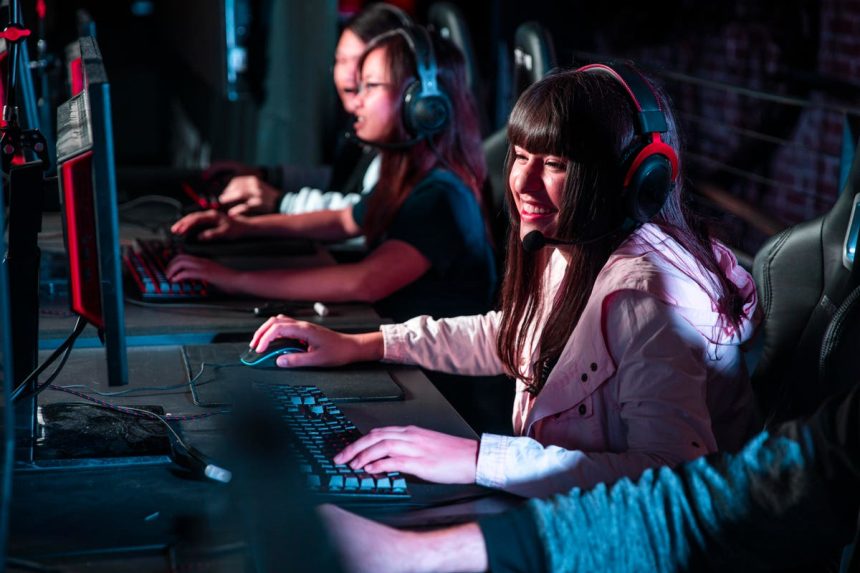Vickie Chen is an 19-year gaming industry veteran and serves as the founder and CEO at AviaGames, Inc.
Forging into the gaming industry can be a difficult process for women. Unfortunately, gender biases, a lack of diversity and the objectification of women are still discouraging too many from progressing in gaming. Some might describe the experience analogous to competing in a multiplayer first-person shooter game, putting up a good fight to protect yourself from constant attack.
The Current Landscape
Ironically, female gamers are more prevalent than ever. According to recent statistics, women represent half of all gamers globally. The latest stats segment the video game industry as 61% men and 30% women, showing an increase in women playing a role. From leaders like Canadian video game producer and executive Jade Raymond (known for her work on the “Assassin’s Creed” series and for founding Ubisoft Toronto), to Studio Director at Riot Games Christina Norman and her involvement in “League of Legends,” to top gaming influencers such as Pokimane, SSSniperwolf, GamingWithJen and Valkyrae, women are influencing the industry.
There is also an increased representation of iconic, brave and determined women characters in AAA titles and Indie games, boosting the depiction of women in today’s gaming environments. From Lara Croft (Tomb Raider) and Lenneth (Valkyrie Profile) to Jaina Proudmoore (World of Warcraft) and Tifa Lockhart (Final Fantasy), female characters are serving as positive role models for women.
Over the past decade, we’ve made progress, with more women leaders in gaming development, publishing and management, and serving as leading characters and examples. However, while some of the gender gaps are closing, one statistic that needs to evolve is the number of women experiencing abuse in games, with nearly 75% of women still reporting levels of harassment playing online games and 59% hiding their gender while playing games to avoid it altogether.
Elements For Continued Change
Looking ahead, I believe it’s critical for all leaders in the gaming industry to acknowledge the impact of women on the future of the industry, embrace their influence and create an environment for ongoing change. Here are some methods that can allow you to do so.
• Gaming Environment Moderation
Gaming publishers and companies need to expand ways to help combat abuse and sexism. For example, tools for moderation can be implemented, such as recording gaming chats and integrating ways for players to report inappropriate activities. In addition, fostering healthy and balanced working environments in today’s gaming studios can help extend fostering safe gaming environments into online gaming worlds.
Workplaces that take additional steps to ensure their employees are empowered to contribute, ask questions and collaborate can help set the benchmark for the gaming industry. For example, consider setting up a company-supported mentorship program to help members learn from positive examples. Another important step is fostering effective workplace communications where both ideas and issues are shared with the common goal of resolving and moving forward. When leaders encourage collaboration and creativity within a diverse and inclusive workplace, that positive atmosphere can extend to the gaming environments teams are designing and building for, as well as the environments that gamers are playing or competing in, and help to diminish exclusion and harassment online.
• Awareness And Support
The industry needs ongoing discussions, sharing and accountability to continue leveling the gender playing field. A range of organizations are dedicated to the awareness and support of gaming companies with safe, diverse and nonsexist gaming cultures and environments, including Women in Games, Girls Who Code, BroadcastHer and Black Girl Gamers. Moreover, the success of today’s female executives coupled with supporting and promoting women within their respective companies and fostering a balanced workforce can help move the industry forward.
Individuals in leadership positions can help set examples by supporting a workplace that integrates inclusive hiring policies, holds ongoing training about diversity and inclusion, and keeps the company accountable to a balanced and fair compensation and promotion strategy. Furthermore, women leaders in particular can use their influence to advocate, share personal experiences and encourage other women to pursue ambitions, even in an industry where the barriers may seem indestructible at times.
As a female founder of a gaming company myself, my growth as a woman in the industry has been an ongoing battle. I still remember the pressure I felt stepping into this world. Ultimately, it was a passion for gaming and the desire to make it available to a more diverse group of people that got me to where I am today. I have seen the differences we can make by supporting women in the industry and increasing the number of female members in management.
• Acknowledging The Role of Women
More and more brands are targeting women through games, understanding the power of catering to female gamers as an extremely important part of today’s gaming world success. For example, beauty brands like NYX Professional Makeup became the official beauty partner of esports organization Dignitas, and E.l.f. Cosmetics launching its E.l.f. You Twitch channel to support young gamers with “absolutely no discrimination.”
Women comprise a significant portion of the user base, showing that the continued development of and marketing to women in games is a successful path for today’s publishers and the growth of gaming. In fact, Mat Piscatella, executive director and video game industry analyst at Circana, shared in June that 47% of console video game players, 50% of PC video game players and 54% of mobile video game players are female, according to Circana’s PlayerPulse monthly study. In addition, an increasing share of women are taking on ambassador roles for gaming companies and serving as examples for future gamers. Yet according to statistics shared by Women in Games, “the number of women working in any role or competing in esports is around 5%, or 1 in 20.” So there is room to keep moving forward.
We need to continue leveling up. Contributing to the ongoing discussion surrounding women, as well as raising awareness of gender inequalities across economic, social and political scopes, may be absolutely vital to the continued progression of the gaming industry.
Forbes Business Council is the foremost growth and networking organization for business owners and leaders. Do I qualify?
Read the full article here










